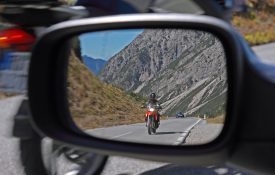-
Seven Ways to Reduce Stress in Anxious Times
Wine. Chocolate. Binge-watching “The Crown.” How are your coping strategies working for you these days? Therapists have, for months, been reporting a significant increase in clients who are stressed and saddened by current events—hurricanes, fires, the threat of nuclear war. In some cases, they say, these large-scale worries are undermining people’s ability to cope with their own private stressors. ... A study by researchers at Yale University and the University of Toronto, published in 2013 in the journal “Psychological Science, showed that people often misattribute the source of their anxiety. They think it is one thing when it really is another. As a result, they make bad decisions.
-
A Big Test of Police Body Cameras Defies Expectations
Usually, we behave better when we know we’re being watched. According to decades of research, the presence of other people, cameras or even just a picture of eyes seems to nudge us toward civility: We become more likely to give to charity, for example, and less likely to speed, steal or take more than our fair share of candy. But what happens when the cameras are on the chests of police officers? The results of the largest, most rigorous study of police body cameras in the United States came out Friday morning, and they are surprising both police officers and researchers.
-
Washington, DC Government Applies Behavioral Science to Study Body-Worn Cameras
The Lab @ DC, a research team within the Washington, DC government, has just released the results of a two-year-long study investigating the effects of police body-worn cameras on policing in DC—the largest study of its kind. This government research team concluded that the introduction of these cameras did not have an effect on either police use of force or civilian complaints, and these findings raise new avenues for further research. The results of this body-worn camera research project are already making waves in some of the US’s premier news outlets.
-

Motorcycles Are Missed Because Drivers Aren’t Looking for Them
Drivers were tested on their ability to spot an unanticipated motorcycle. If this were a test in school, they would have failed.
-
How Much Sacrifice Is Your Reputation Worth?
Psychologist Abraham Maslow's famed “hierarchy of needs” says people seek food, shelter and safety before esteem and self-actualization. So what explains foolish dares and violent sports, in which people risk grave injury to pursue respect? New research suggests the hierarchy may be more fluid than we think—many individuals will undergo disgusting or painful ordeals to save their reputations. Andy Vonasch, a psychologist at the University of North Carolina at Chapel Hill, and his colleagues conducted an online survey of 111 Americans about the value of reputation.
-
Switching To Middle School Can Be Hard On Kids, But There Are Ways To Make It Better
"I'll be famous one day, but for now I'm stuck in middle school with a bunch of morons." That's harsh language from the downtrodden sixth-grade narrator of Diary of A Wimpy Kid, a blockbuster series of graphic novels. But it speaks to a broader truth. A large body of research suggests that students who go to middle school or junior high do worse academically, socially and emotionally, compared to the young teenagers who get to be the oldest students at schools with grades K-8. ... The negative effects were exaggerated for students from higher-income households. That surprised Elise Cappella, a lead author on the study and associate professor of applied psychology at New York University.

